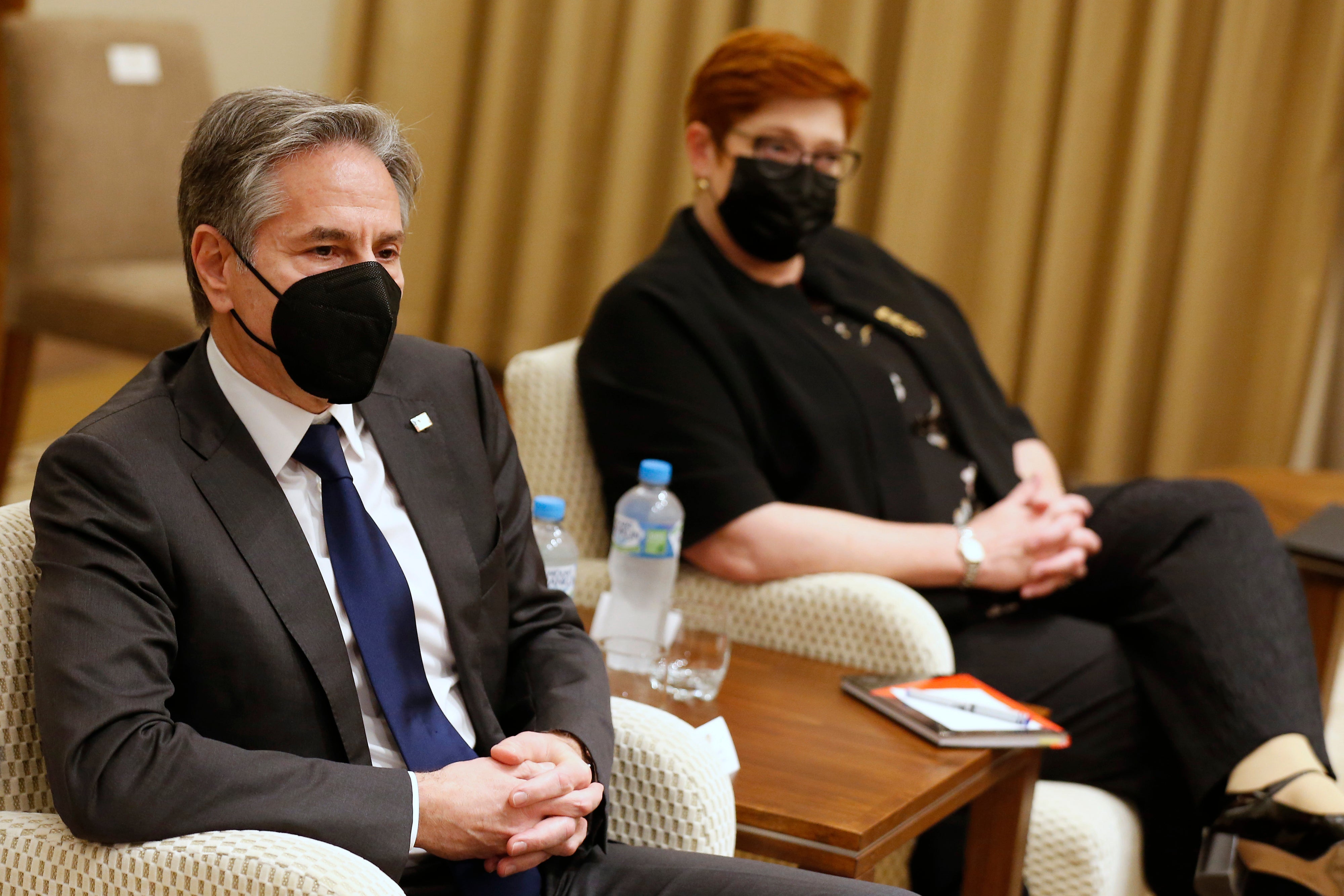Blinken says confrontation with China not inevitable
Secretary of State Antony Blinken says confrontation with China is not inevitable, but the United States must stand up with its allies for a rules-based system threatened by Chinese aggression

Your support helps us to tell the story
From reproductive rights to climate change to Big Tech, The Independent is on the ground when the story is developing. Whether it's investigating the financials of Elon Musk's pro-Trump PAC or producing our latest documentary, 'The A Word', which shines a light on the American women fighting for reproductive rights, we know how important it is to parse out the facts from the messaging.
At such a critical moment in US history, we need reporters on the ground. Your donation allows us to keep sending journalists to speak to both sides of the story.
The Independent is trusted by Americans across the entire political spectrum. And unlike many other quality news outlets, we choose not to lock Americans out of our reporting and analysis with paywalls. We believe quality journalism should be available to everyone, paid for by those who can afford it.
Your support makes all the difference.Confrontation with China is not inevitable, but the United States must stand up with its allies for a rules-based system threatened by Chinese aggression, Secretary of State Antony Blinken said Friday.
Blinken was speaking shortly before a meeting with the foreign ministers of Australia, India and Japan. The four nations form the so-called “Quad,” a bloc of Indo-Pacific democracies created to counter China’s regional influence.
Asked by a reporter if a confrontation with China in the Indo-Pacific was inevitable, Blinken replied: “Nothing is inevitable.”
“I think we share concerns that in recent years China has been acting more aggressively at home and more aggressively in the region and indeed potentially beyond,” Blinken said.
The Quad partners are united by an “affirmative vision for what the future can bring” and a "commitment to defend the rules-based system that we have spent tremendous time and effort building,” he added.
Blinken’s trip is designed to reinforce America’s interests in Asia and its intent to push back against increasing Chinese assertiveness in the region. He will also visit Fiji and discuss pressing concerns about North Korea with his Japanese and South Korean counterparts in Hawaii.
The Chinese Foreign Ministry this week accused the United States of using the Quad to force other countries to accept the standards of American democracy.
Australia has suffered trade retaliation in recent years for angering Beijing for actions that include outlawing covert foreign interference in domestic politics, banning Chinese tech giant Huawei from major infrastructure projects and demanding an independent investigation into the origins of the COVID-19 pandemic.
Australian Prime Minister Scott Morrison said he felt reassured by the shared commitment against coercion after meetings with Blinken, Indian External Affairs Minister Subrahmanyam Jaishankar and Japanese Foreign Minister Hayashi Yoshimasa.
“The things we discussed today are principally how we will continue to always stand up for our values ... which is what unites us most,” Morrison said.
“In doing so, we stand up to those who would seek to coerce us. And as I understand from our Quad partners, none of you understand better than we do. And that is a great comfort to us that the coercion and the pressure that Australia has been placed on, we greatly appreciate your support,” he added.
Australian Defense Minister Peter Dutton told Parliament on Thursday that Australia was facing the “most complex and potentially catastrophic regional security environment” since World War II.
Earlier on Friday, Blinken and Hayashi held a bilateral meeting in which they expressed “deep concern” about Russia’s beefing up of its military at the Ukrainian border, a Japanese Foreign Ministry official said on condition of anonymity citing protocol.
The leaders also shared “grave concern” about North Korea’s escalating nuclear and missile development, the official said.
Australian Foreign Minister Marise Payne, who is chairing the Quad meeting, said the agenda would include COVID-19 vaccine distribution, cyber and critical technologies, countering malicious and dangerous disinformation, terrorism, maritime security and climate change.
Blinken is expected to address threats posed by a growing partnership between authoritarian Russia and China, particularly after the Sunday meeting in Beijing between Russian President Vladimir Putin and Chinese leader Xi Jinping at the opening of the Winter Olympics.
____
Associated Press writer Mari Yamaguchi in Tokyo contributed to this report